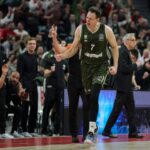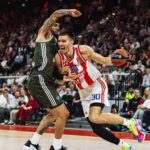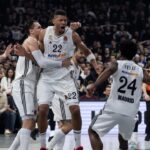In the leadup to the 2011-12 Eurocup Final Four tournament beginning on Saturday, Eurosport Turkey basketball commentator Uygar Karaca contributes a series of previews on the remaining quartet entitled “Four Teams, Four Stories” to BallinEurope.
Today, the final chapter of the series is devoted to BC Khimki Moscow region. With VTB United League and Russia Cup titles already in the club’s recent history, will they finally break through with a pan-European championship? Karaca seems to think so…
BC Khimki Moscow region is a relatively young club on the international basketball scene. However, they improved themselves quite rapidly: Coming from the same line of teams such as Avtador, Ural Great, UNICS and Lokomotiv Rostov which presented themselves as alternative powerhouses to CSKA Moscow, Khimki managed to earn a Russian Cup in 2008 and the VTB United League title in 2011. The missing trophy from the shelf is a pan-European prize. The team came close in 2006 against Joventut and in 2009 against Rytas with losses in the Eurocup finals both years. The hosts hope to be third-time lucky on their home court.
The club was founded in 1997 and named Sergei Elevich as the head coach, giving Sergey Selivanov the assistant role. This duo actually continued to work together for Khimki until 2006. During the period following club general manager and “kind of symbol” Victor Bychkov’s involvement in 2000, the team was made of just Russian players. Valeriy Sizov was the first captain and Sergei Bazarevich helped the team to get into Russian Superleague. Captains like Dmitri Volokhov, Alexey Vadeev and the late Alexey Petrenko along with other veterans such as Vitaly Nossov, Oleg Meleschenko, Mikhail Soloviev played for the club for a long time.
The big investment decision came from current president Aleksandr Bodunkov in the 2003-2004 season which saw players like Ruben Wolkowisky, Melvin Booker and Oscar Torres joining and carrying the club to the FIBA Europe League final four but could not stand up to the David Blatt’s team, the now-defunct Dynamo St. Petersburg. Reinforcements continued to arrive and finally, in 2006, BC Khimki reached its first final, only to be beaten by Joventut Badalona, a team that legendary Spanish coach Aito Garcia Reneses had revived. The efforts of Ademola Okulaja, Gianmarco Pozecco and Boris Gorenc was not enough.
The next step came in 2008-2009 season. That year, the financial crises blew out from the US and many NBA players started to come and play in Europe. Khimki started the season in a problematic way. Whether there was something wrong with the wages or not, Kestutis Kemzura finally resigned after a series of bad results. Sergio Scariolo was given a huge task and did very fairly well under the circumstances. Jeromo Moiso, Carlos Delfino, Maciej Lampe, Vitaly Fridzon, Mike Wilkinson, Jorge Garbajosa and of course Kelly McCarthy started to play as a team and again found themselves in the Eurocup finals, this time against Rimas Kurtinaitis’ Lietuvos Rytas. And again the opponents were the better team.
Kurtinaitis was appointed as the new Khimki head coach in March last season after both Scariolo and his replacement Oleg Meleschenko left. Kurtinaitis led the team to the VTB United League title and the PBL silver medal.
After all those years in the Euroleague, Khimki pledged themselves to finally get a European crown in 2012. But their best scorer, Keith Langford, decided to leave for Maccabi Tel Aviv, while Raul Lopez returned to Spain. However, apart from Timofey Mozgov, who made things easy for them in the beginning of the season, the intention in signing new players for 2011-12 was not recruiting superstars but useful team players. It seems like the strategy has paid off. Khimki was among the rare teams that managed to beat CSKA this season. Thus far, they’ve suffered just two PBL losses, have clinched a VTB League quarterfinal berth, and have advanced to the Eurocup Final Four with only one loss in the competition.
As with all the remaining teams except Valencia, Khimki plays an intensive zone defense that is usually fatal for opponents. Usually, three-quarter court or full-court zone presses are operated. This team also boasts great depth in the squad with experienced, mature aged players. Khimki likes to play near the rim on offense and for this, the compatibility and understanding between Zoran Planinic and Kresimir Loncar is used frequently.
Planinic shares the leadership responsibilities of the group with captain Vitaly Fridzon. Aware of such responsibility, Fridzon rarely disappoints and has become a club hero. When defenders try to solve the hard line between the Croatian duo, Fridzon makes deadly cuts and shoots with high percentage from his favourite place on the court: the baseline.
Sniper Thomas Kelati is mostly sent on court for special missions. Already a Eurocup winner with Valencia in 2010, the Eritrean-Pole buried six three-pointers out of seven against Lokomotiv Kuban in the first quarter of their final encounter, the key win to the final four.
Beware Alexey Zhukanenko under the rim if you are attacking, because this guy is a wall on defense and beyond has been scoring consistently in recent matches. After the departure of Timofey Mozgov, Khimki needed a big player and when it was decided that Marionas Petravicious was not the man for the job, Jeff Adrien was added. Coming from the Houston Rockets, Adrien started the season at Benetton Basket and the effectiveness level that he had in those days may be something he’s hiding for the Final Four stage. Day by day, he gets better.
Of course, for both offensive and defensive impact, there is Matt Nielsen the Australian. Nielsen could be used by any team seeking a fighter to do the dirty work – Khimki is no exception. The shooters can send the bombs more confidently knowing that Matt will make life hard for defensive rebounders. Plus, Nielsen’s court vision and passing skills should not go unnoticed.
Veteran Sergey Monya is the silent force: He steps up when others stop, especially against zone defenses by using his ability to score behind the arc. Moreover, last year Monya finished the PBL regular season tops in the blocks and defensive rebounds.
To help the organization on court, Dmitri Khvostov arrived from Dynamo Moscow. He’s taken on great responsibility from at a young age with the Russian national team and Dynamo, and Kurtinaitis therefore did not hesitate to call him when needed.
There former Miami Heat guard Chris Queen, an NCAA-type player with team-first attitude and high basketball IQ. You can see him dribble, shoot a three-pointer or cut along the baseline where he gets a significant number of assists. For defensive roles, Egor Vyaltsev is most suitable. Recruited at CSKA, coming from Triumph, Vyaltsev showed that he can be dangerous if one treats him unfairly while defending – Donetsk and Budivelnik know this well in fact, as he scored 19 and 20 points respectively against these teams.
Honestly speaking, if this is not the time for Khimki to get a European title, then when? Their sponsor, Promsvyazbank, is the sponsor of the organisation and the team are at home. Undefeated against Spartak St. Petersburg, the boys from Khimki Region have the statistical edge, too. A Euroleague ticket doesn’t seem so far away…





Leave a Reply